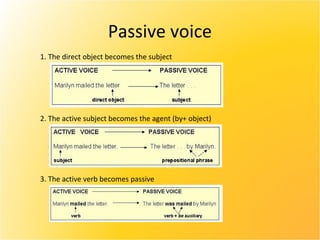
Passive
- 1. Passive voice 1. The direct object becomes the subject 2. The active subject becomes the agent (by+ object) 3. The active verb becomes passive
- 2. PASSIVE VOICE Active: S+V+O Passive: S + Be + PP(V3ed) + by O (tense) EX: My father planted this tree last year. This tree was planted by my father last year.
- 3. USES OF PASSIVE VOICE Because it is more direct, most writers prefer to use the active voice whenever possible. • The passive voice may be a better choice, however, when the doer of the action is unknown, unwanted, or unneeded in the sentences: • The writer wishes to emphasize the action of the sentence rather than the doer of the action:
- 4. By agent • We don’t use by+ agent in the following cases: - When the action is more important than the person who did it. All roads were closed due to the flood. - When we don’t know who did the action or when it is obvious who did it. They were arrested yesterday. - When we are writing a formal, academic or scientific sentence. The results will be published in next month’s magazine.
- 5. VERBS WITH TWO OBJECTS Some verbs can have both a direct and an indirect object: give, send, show, lend, ask, tell, order, pay, bring, allow. His mother bought him a wooden horse in Paris. IO DO With these verbs changes into the passive can be done in two different ways. This is called the double passive. A wooden horse was bought to him by his mother He was bought a wooden horse by his mother. Notes: Sentences in which the indirect object becomes the subject are more common. If we begin the sentences with the direct object, the indirect object is preceded by the preposition to, except for the verbs keep and make, where the indirect object is preceded by the preposition for.
- 6. PASSIVE VOICE WITH CAUSATIVE FORM HAVE/GET SOMETHING DONE IS USED TO EXPRESS ACTIONS THAT WE CAN’T OR DON’T WANT TO DO OURSELVES. VERY OFTEN THESE ACTIONS ARE CARRIED OUT BY PROFESSIONALS. Active: S + Has/Have + O1 + V (BI)+ O2 S + Get + O1 + V (to-infinitive) + O2 Passive: S + Has/Have/Get + O2 + PP EX: My father had Tom wash his car. My father had his car washed by Tom
- 7. PASSIVE WITH REPORTING VERBS Another type of sentence that has two possible forms in the passive is that consisting of Subject+Verb (say, feel, expect, etc.)+Noun clause Object: a. They say that he knows some very influential people. b. People felt that the social workers were doing valuable work. c. Everyone thought that the government had shown scant regard for public opinion One possible construction is that where the sentence is introduced by the impersonal it: a. It is said that he knows some very influential people. b. It was felt that the social workers were doing valuable work. c. It was thought that the Government had shown scant regard for public opinion. Another construction is possible: The subject of the noun clause may be made the subject of the whole sentence in the passive. A special characteristic of this construction is that the verb in the noun clause takes the infinitive form: a. He is said to know very influential people.